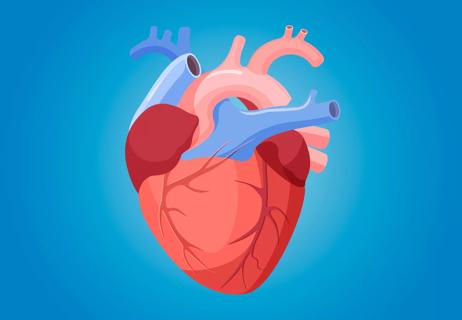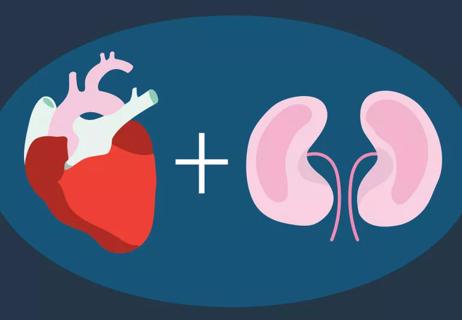Having underweight, having overweight and having obesity can be dangerous for your heart

You’ve probably heard that having overweight or obesity is bad for your heart. And you might have heard that having underweight or severe underweight can be just as bad. But those terms can confuse as much as they clarify. And the relationship between weight and cardiovascular health isn’t necessarily that simple either.
Advertisement
Cleveland Clinic is a non-profit academic medical center. Advertising on our site helps support our mission. We do not endorse non-Cleveland Clinic products or services. Policy
We all have our own unique medical history. And the number we see when we step on a scale is just one of many different factors impacting our heart health. And weight itself is complicated: Not all adipose tissue (body fat) is created equal.
So, what’s the best way to think about the relationship between body mass and heart health? We asked cardiologist Steven Nissen, MD.
But before we dive into the details, let’s be clear about our terminology.
These days, you’d be hard-pressed to find a medical professional who’s a fan of the Body Mass Index (BMI). It’s too imprecise. But despite its many issues, BMI is the most widely used tool we have for talking about weight at a population level right now. So, in this article:
These differences are important because — according to Dr. Nissen — as little as five pounds gained or lost has the potential to impact your heart health.
Advertisement
Dr. Nissen says that there are a lot of different reasons why carrying extra weight might negatively impact your cardiovascular health. The type and severity of the impact, research suggests, varies from person to person.
That’s because the weight itself isn’t what’s causing the elevated risk of cardiovascular disease. It’s the related (comorbid) conditions that frequently tag along. High blood pressure (hypertension) is a good example. While not all people with overweight or obesity have high blood pressure, having one condition makes you more likely to have the other.
“High blood pressure is a risk factor for heart attack, stroke and sudden cardiac death,” Dr. Nissen states.
Increased body weight is also frequently linked to high cholesterol (hyperlipidemia). We’re talking specifically about having high triglyceride levels (fat from the food we eat) and low “good” cholesterol (HDL cholesterol). This combination, Dr. Nissen explains, often plays a key role in heart disease because it can cause the arteries to harden.
Having overweight or obesity also raises the risk of developing Type 2 diabetes. Having high blood sugar can, over time, damage both your blood vessels and the nerves that control your heart.
A conversation about overweight, obesity and cardiovascular health also has to include inflammation.
“Fat cells, particularly those in the abdominal area, are active metabolically,” Dr. Nissen explains. “They cause inflammation in your body. We can measure this inflammation by the amount of C-reactive protein in your blood, yet one more risk factor for heart disease.”
All of these factors — high blood pressure, high cholesterol, diabetes and inflammation — come together, creating a constellation of interconnected conditions associated with heart disease.
The relationship between underweight and heart disease is less studied and, as a result, more controversial. But the research to date offers plenty of interesting insight.
Two 2022 studies, one in Nature and one in the Journal of the American Heart Association, found that people with underweight who were living with heart disease were actually more likely to die than people with BMI scores between 20 and 35. But those studies only looked at people who had heart disease already. They didn’t ask if being underweight is associated with cardiovascular illness.
Earlier — when we were talking about having overweight and obesity — we mentioned that comorbidities like high blood pressure and diabetes are the primary reason extra weight is correlated with an elevated risk of heart disease. It seems the same goes for underweight.
Advertisement
Anorexia nervosa is an example. We know that heart disease is a common complication (and even cause of death) in people who have anorexia nervosa. But it’s more complicated than that, Dr. Nissen explains.
“Patients with anorexia nervosa can have various health problems, including heart disease, because they have malnutrition,” he says. “From that perspective, it’s not the low weight itself that’s bad for the heart.”
He points out that having underweight and severe underweight (like having overweight and obesity) can also be a symptom of an underlying medical condition.
“It’s possible that a person isn’t eating because they’re unwell,” he suggests. He points to the fact that unexplained weight loss is often one of the first signs of cancer as an example of this phenomenon. Even some heart conditions can cause dramatic weight loss. For example, between 10% and 40% of people with heart failure develop cardiac cachexia, which is a form of malnutrition and muscle loss.
So, what do all these correlations, studies and numbers mean for you? The American Medical Association states that “BMI is significantly correlated with the amount of fat mass in the general population but loses predictability when applied on the individual level.” That’s a fancy way of saying that you need to think beyond your BMI.
Advertisement
These are some of the other factors they suggest keeping in mind:
Visceral fat isn’t the kind of fat you see and feel when you pinch your skin. It’s the fat that’s deeper down, surrounding your abdominal wall and encircling your organs. We need visceral fat, but too much of it raises our risk of health problems, including heart disease.
So, how do you know how much of your fat is visceral fat? Studies suggest that body shape is the best way to know.
“It’s about where you carry your weight,” Dr. Nissen clarifies. “Carrying extra weight around your abdomen — it’s often called having an ‘apple’ shape — is more associated with heart disease than carrying excess weight in your hips and thighs, ‘pear’ style.”
He notes that men who have overweight or obesity often have an apple shape. Women with overweight are more likely to have a pear shape.
“Research suggests that people whose fat is distributed in a pear-shape are less likely to have the metabolic problems — such as diabetes and high blood pressure — commonly linked with heart disease,” Dr. Nissen adds. As a result, your waist-to-hip ratio (also known as “relative fat mass”) may be as important as BMI in determining your risk. The higher the ratio, the greater your risk of heart disease.
Advertisement
While knowing that the places we store extra weight can have some predictive value, it’s important to keep in mind that if you’re within a healthy weight range, your shape doesn’t indicate that you’re in poor health.
Have you ever heard of the Body Adiposity Index (BAI)? It’s a way to measure your body fat percentage that gets at the question of body shape. On its own, it may not be the best measurement, but researchers have found it works better than the BMI in some populations and can be useful for risk-assessment purposes when considered alongside BMI.
Based solely on BMI, several of the world’s greatest athletes would qualify as having overweight or obesity. That’s because BMI doesn’t account for muscle mass.
It’s important to keep your level of physical activity in mind when you’re thinking about heart health. Knowing your body fat percentage can be particularly helpful.
Context is everything. If numbers aren’t painting a clear enough picture of your heart’s health, look to your family tree. How many members of your family have (or had) cardiovascular disease? How closely related are they? How old were they when their heart issues started? This is all valuable information to share with your provider. You might also want to let them know about your family’s history of hypertension, diabetes and high cholesterol, as these conditions are strongly correlated with heart disease.
Every year, we’re learning more about the role genetics plays in determining the relationship between weight and heart health. A 2021 study found 62 different gene variants that “uncouple adiposity from its cardiometabolic complications.” In other words, the study found that some people are genetically predisposed to have both obesity and a low risk of the related conditions we typically associate with heart disease.
The big takeaway: When it comes to research of the human body, rules are made to be broken.
For people with overweight or obesity, there’s good news: You don’t need to drop a bunch of weight to boost your heart health.
Dr. Nissen says that losing just five to six pounds can lower your blood pressure by 5 millimeters of mercury (mmHg). And reducing your body weight by 2% to 5% will raise your “good” cholesterol (HDL) and reduce your triglycerides by as much as 20%.
“Even a modest amount of weight loss makes a big difference, including reducing your risk for diabetes and inflammation,” he says.
For people with underweight or severe underweight, gaining weight can make a similarly big difference. But — as is the case for people with overweight and obesity — the “how” is important. Gaining weight safely is the name of the game.
Whether you’re trying to lose or gain weight, a heart-healthy eating plan is key. That means eating a largely plant-based diet that emphasizes healthy fats, like the Mediterranean diet. When in doubt, talk to your provider. They can offer insight and connect you to resources that will improve your chances of meeting your goals.
Generally speaking, our hearts like moderation. Both having underweight and obesity (as measured by the BMI) are associated with a higher risk of cardiovascular disease. But if you really want to get a sense of your individual risk, you need more information.
Use measurements like your relative fat mass, body fat percentage and body adiposity index — along with your family medical history, blood pressure, cholesterol and insulin resistance — to paint a clearer picture of your heart health. If you aren’t happy with your risk profile, talk to a healthcare provider. They can help put you on a path to reach a weight that’s healthy for you in a way that’s safe, sustainable and heart smart.

Sign up for our Health Essentials emails for expert guidance on nutrition, fitness, sleep, skin care and more.
Learn more about our editorial process.
Advertisement

It’s an emergency if the pain doesn’t go away, gets worse or you have other worrying symptoms

Age, sex and genetics are just a few factors that can affect your risk of developing coronary artery disease

Move a little more, eat a little healthier, sleep a little better and destress a lot

Avoid smoking, eat a good diet and exercise to prevent your heart from aging prematurely

Your life depends on this incredible organ doing its job 24/7

Unlock the secret of your body’s hardest-working organ

What's good for one is good for the other

What you need to know about BMI, fasting glucose, triglycerides and more

Even small moments of time outdoors can help reduce stress, boost mood and restore a sense of calm

A correct prescription helps your eyes see clearly — but as natural changes occur, you may need stronger or different eyeglasses

Both are medical emergencies, but they are very distinct events with different causes